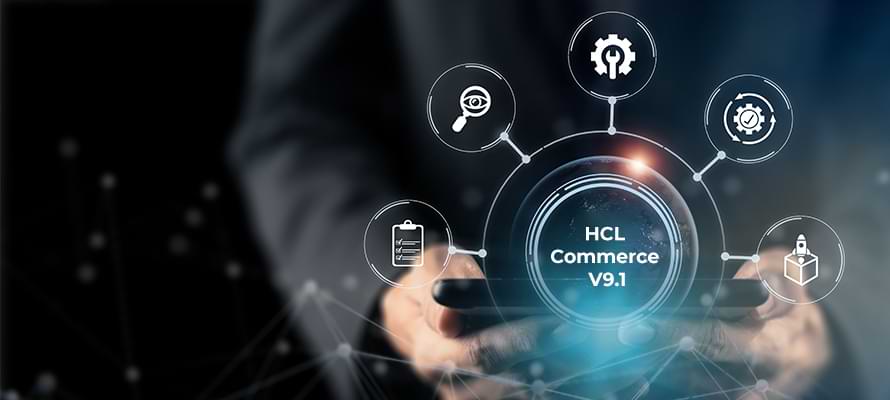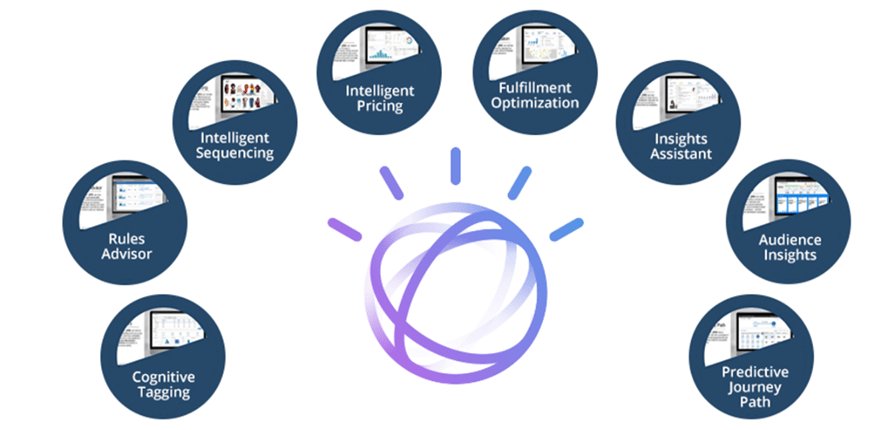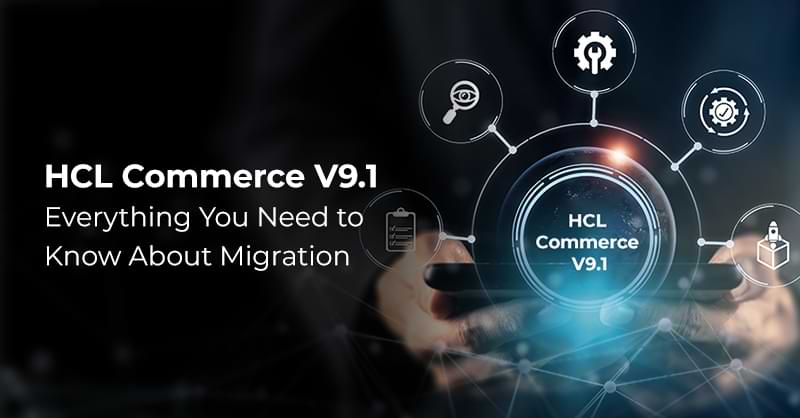HCL Commerce V9.1: Everything You Need to Know About Migration

Written by Manpreet Kaur
Content Writer
November 22, 2022
The introduction of Version 9.1 iteration of HCL Commerce brings with it advanced technology updates that are essential for businesses to pull off success in the competitive landscape. Interestingly, many businesses have migrated to HCL Commerce v9 and put its technological offerings to use taking all challenges in their stride. However, before you begin, it is necessary to outline the prerequisites – reasons, strategies, plans, integrations, and much more. Read this blog to discover how migrating to HCL Commerce Version 9 brings fundamental changes in the features and functionality of your existing solution/site.
How Does Migrating to HCL Commerce V9 Help Businesses?
The version brings with it technology and architectural changes that helps businesses to scale their processes, operations, and infrastructure based on needs. The docker technology runs preconfigured containers (having OS), eliminating the need to manage OS. It makes deployment of new configurations easy, simplifies troubleshooting, and fastens task completion. Upgrading your existing platform to V9 ensures significant benefits as it streamlines operation and maintenance and paves the path to take your business to next levels.
Highly Flexible Catalog Management with Product Variants
The HCL Commerce V9 offers a three-tier product model for versatile product management. In the monolithic model, the product class contains attributes without content, with SKUs containing product information. Product variants collect similar product attributes into one item. For example, instead of having only product categories ‘ jewelry’ and individual SKUs with attributes such as material, color, and craft, you can define a variant such as ‘silver jewelry’ or ‘fashion jewelry.’ Product variants help you target sales, promotions, and other actions quickly.
Easy Installation, Deployment, and Operation with IBM Cloud Private
It is possible to use IBM Cloud Private to install, deploy, and operate your HCL Commerce V 9.0 runtime environments on Kubernetes, eliminating the manual work involved with configuring a containerized orchestration.
Modernized Business User Tooling
The new version 9.1 removes legacy business user tooling and streamlines access to and enhances the quality-of-life functionality within their replacements.
Support for New Integrations and Companion Software
HCL Commerce V 9.1 offers new integrations and support for various companion software solutions. This includes integration with HCL Digital Experience for powerful and simple-to-use content management.
Businesses can use one or more marketplaces to sell products from different retailers. Also, shoppers can select products based on single or multiple seller names. This feature is accessible for React stores (Emerald and EmeraldPlus).

Solutions Offered by HCL Commerce Version 9.1
Externalized Customizations
Externalized customizations separate customizations & extensions from the platform enabling fast upgrades and removal of expensive testing cycles that hamper innovation. Also, they give better control to manage and release custom extensions and create deployable packages faster for deploying custom changes.
Docker Containers
With Docker containers, you can easily create, deploy, and run applications and spend time on innovation with low maintenance. They offer consistent development environments for the whole team. For example, developers use identical OS, system libraries, and language.
Java Persistence API (JPA Architecture)
The JPA architecture is more lightweight than EJBs and facilitates quick code creation. It includes a group of methods and classes to persistently store large amounts of data in a database and interact with database instances easily.
jQuery Aurora Store
The jQuery Aurora Store is revised in jQuery, a JavaScript library. The store pages load only important JavaScript and CSS files, improving store performance and page load time. In v9, jQuery replaced Dojo, which was quite heavy and made debugging difficult for UI developers.
Elasticsearch-Based Search Solution
The Elasticsearch-based search solution comes with NLP (Natural Language Processing with Stanford CoreNLP) that enhances search relevance. It contains Data microservices, which run in their specific containers and maintain backward compatibility with storefront, Commerce Transaction Server, and Xc customizations.
Reference React Stores
HCL Commerce v9 offers two reference stores for B2B (Emerald) and B2C (Sapphire) that use React framework, Elasticsearch-based search solution, and architectural enhancements. These reference store applications contain the following:
- Standard SPA model with B2C and B2B components
- Product and Category Pages
- Managed metadata
- Supports Progressive Web Applications (PWA)
- Managed page structure in React-based components and JSON
Cloud-Native
HCL Commerce V9.1 reiterates the containerized cloud-native architecture of HCL Commerce V9.0, along with deployment on Kubernetes. It is possible to use HCL Software Factory to design and preview software solutions before creating a Helm Chart for deployment.
Essential Elements to be Considered when Designing an HCL Commerce Migration Plan
- Custom application Code and Scripts
- Development and Runtime Environments
- Deployment Processes
- Migration Restraints
- Training and Support
- Application Code and HCL Commerce Server Upgrades
- Build Processes and Testing
List of WebSphere Commerce and HCL Commerce Versions that you can Migrate to HCL Commerce Version 9.1
- IBM Websphere Commerce Version 7 – Feature Pack 6, Feature Pack 7, and Feature Pack 8
- IBM Websphere Commerce Version 8 – Mod Pack 1 or higher
- HCL Commerce Version 9.0
Phases of Migration
The migration process involves three major phases – planning phase, practice phase, and production migration phase. All these phases have their resources and need adequate time to ensure no crucial tasks are missed.
Planning Phase
This involves noting HCL Commerce assets, including servers, software, documentation, custom code, and databases. This helps understand the customizations and system integrations with external systems.
Record all business and hardware requirements. Why do you need to switch to a new HCL Commerce version? First, extract all information from the current site, such as use cases, test cases, and design documentation. Next, migrate the production environment to new hardware to prevent downtime. Set up the new environment, deploy, and validate the migrated customizations in advance. If you intend to include more hardware, utilize new hardware for new site and use existing hardware for surplus capacity and testing environments.
The planning phase involves skilled professionals, including solution architects, project managers, developers, and database administrators. It is essential to ensure test and development environments are in sync with the current code version in production. Maintain a record that includes everything – usernames, passwords, rollback plans, timing, checkpoints, and validations. If your team needs the training to use new technology, make sure you make necessary arrangements.
Practice Phase
The practice phase is categorized as follows:
- Migrating the Development Environment: It involves migrating to a development environment early to find the changes that need to be performed on the custom code. Also, it helps developers to write code for the new HCL Commerce version.
- Migrating the Test Environment: It involves end-to-end migration to determine production migration’s outcomes. Scheduling every migration activity gives an insight that proves helpful in refining the project schedule. It also tests rebuilding staging environment from the test server and reduces downtimes.
- Production Migration Phase: The HCL Commerce Version 9 has a low downtime, ensuring you can serve traffic during migration. Significant production migration occurs offline. Only the live database moves from one runtime environment to another.

Why Choose Royal Cyber?
Royal Cyber offers a Fast Track v9 Migration package for HCL Commerce to help you migrate to the latest version in less than two months. Our certified experts use effective strategies and technologies to help you build a sustainable business keeping up with the ever-changing trends. We also offer dedicated assessment, implementation, support, and training services to ensure a seamless migration. Connect with us to learn more about our 2 Week Complimentary v9 Migration Assessment and Fit-Gap Analysis.
Recent Blogs
- An Insight into ServiceNow Hardware Asset Management (HAM) Ramya Priya Balasubramanian Practice Head ServiceNow Gain …Read More »
- Learn to write effective test cases. Master best practices, templates, and tips to enhance software …Read More »
- In today’s fast-paced digital landscape, seamless data integration is crucial for businessRead More »



